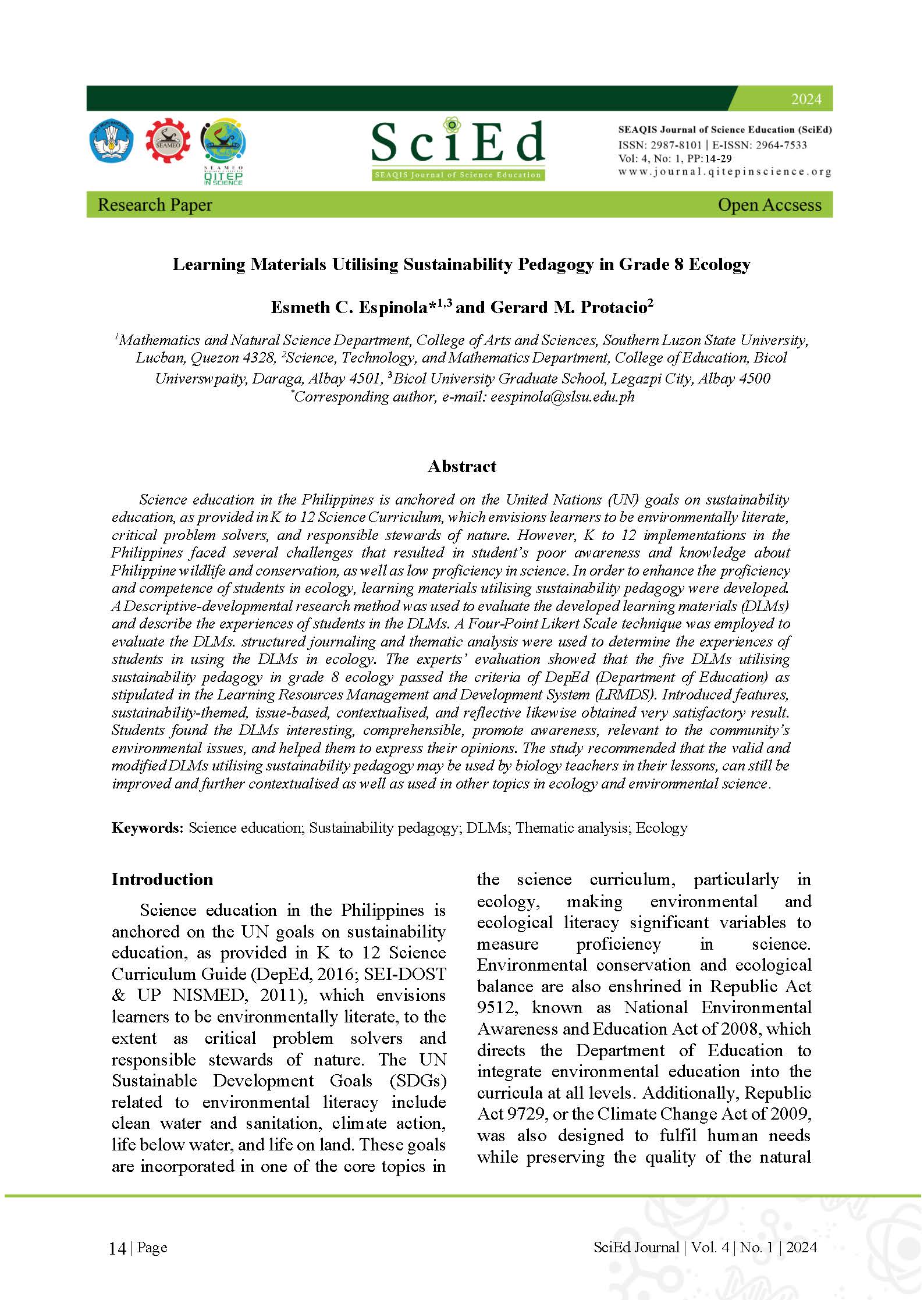Learning Materials Utilizing Sustainability Pedagogy in Grade 8 Ecology
DOI:
https://doi.org/10.58249/sjse.v4i1.123Keywords:
Science education; Sustainability pedagogy; DLMs; Thematic analysis; EcologyAbstract
Science education in the Philippines is anchored on the United Nations (UN) goals on sustainability education, as provided in K to 12 Science Curriculum, which envisions learners to be environmentally literate, critical problem solvers, and responsible stewards of nature. However, K to 12 implementations in the Philippines faced several challenges that resulted in student’s poor awareness and knowledge about Philippine wildlife and conservation, as well as low proficiency in science. In order to enhance the proficiency and competence of students in ecology, learning materials utilising sustainability pedagogy were developed. A Descriptive-developmental research method was used to evaluate the developed learning materials (DLMs) and describe the experiences of students in the DLMs. A Four-Point Likert Scale technique was employed to evaluate the DLMs. structured journaling and thematic analysis were used to determine the experiences of students in using the DLMs in ecology. The experts’ evaluation showed that the five DLMs utilising sustainability pedagogy in grade 8 ecology passed the criteria of DepEd (Department of Education) as stipulated in the Learning Resources Management and Development System (LRMDS). Introduced features, sustainability-themed, issue-based, contextualised, and reflective likewise obtained very satisfactory result. Students found the DLMs interesting, comprehensible, promote awareness, relevant to the community’s environmental issues, and helped them to express their opinions. The study recommended that the valid and modified DLMs utilising sustainability pedagogy may be used by biology teachers in their lessons, can still be improved and further contextualised as well as used in other topics in ecology and environmental science.
References
Ardoin, N., & Heimlich, J. (2021). Environmental learning in everyday life: foundations of meaning and a context for change. Environmental Education Research, 27:12, 1681-1699, DOI: 10.1080/13504622.2021.1992354
Arga, H. S., & Rahayu, G. D. (2019). Influence of Environment-based Learning Materials to Improve the Eco-literacy of PGSD Students. Mimbar Sekolah Dasar, 6(2), 208-218. doi:10.17509/mimbarsd.v6i2.17521
Ashley FA, Gibson B, Daly B, Lygo Baker S, Newton JT. (2006). Undergraduate and postgraduate dental student's 'reflection on learning': A qualitative study. Eur J Dent Educ, 10:10-19.
Bar-Yam, M., Rhoades, K., Sweeney, L., Kaput, J., and Bar-Yam, Y. (2002). Complex Systems Perspectives on Education and the Education System. New England Complex Systems Institute. Retrieved September 20, 2022, from https://necsi.edu/changes-in-the-teaching-and-learning-process-in-a-complex-education-system
Burns, H. (2013). Meaningful Sustainability Learning: A Study of Sustainability Pedagogy in Two University Courses. International Journal of Teaching and Learning in Higher Education, 25(2), 166-175.
Burns, H. (2011). Teaching for transformation: (Re)designing sustainability courses based on ecological principles. Journal of Sustainability Education, 2. Retrieved from: https://pdxscholar.library.pdx.edu/elp-fac/20/
Cajurao, E. (2019). Development and Validation of Lessons in Ecology Integrating Concepts of Sustainable Development. Asia Pacific Journal for Multidisciplinary Research, 7(4), pp. 20-28. Retrieved May 21, 2020, from https://www.apjmr.com
Cheng, Ping-Han, Ting-Kuang Yeh, Yen-Kai Chao, Jing Lin, and Chun-Yen Chang. (2020). Design Ideas for an Issue-Situation-Based Board Game Involving Multirole Scenarios. Sustainability 12, no. 5: 2139. DOI: 10.3390/su12052139
Colomer, J., Serra, T., Canabete, D., Bubnys, R. (2020). Reflective Learning in Higher Education: Active Methodologies for Transformative Practices. Reflective Learning in Higher Education, 12(9), 3827. DOI: 10.3390/su12093827
Council of Europe. (2022). Manual for Human Rights Education with Young People. Retrieved February 8, 2022, from https://www.coe.int/en/web/compass/discrimination-and-intolerance
Department of Education. (2016). Evaluation rating Sheet for PRINT Resources. Retrieved February 6, 2022, from https://depedpines.com/wp-content/uploads/2015/11/6.4-Evaluation-Rating-Sheet-for-PRINT-Resources.pdf
Department of Education. (2016). K to 12 Curriculum Guide Science. Retrieved February 15, 2021, from http://www.deped.gov.ph
Dizon R.L., Calbi, J.S., Cuyos, J.S., and Miranda, M. (2019). Perspectives on the implementation of K to 12 program in the Philippines: A research review. International Journal of Innovation and Research in Educational Sciences, 6 (6), pp. 757-767. Retrieved February 15, 2021, from https://www.ijires.org/administrator/components/com_jresearch/files/publications/IJIRES_1638_FINAL.pdf
Duncan, T., Mimeau, C., Crowell, N., Deacon, H. (2021). Not all sentences are created equal: Evaluating the relation between children’s understanding of basic and difficult sentences and their reading comprehension. Journal of Educational Psychology. 113. 268–278. DOI: 10.1037/edu0000545.
Elder, A. D. (2015). Using a brief form of Problem-Based Learning in a research methods class: Perspectives of instructor and students. Journal of University Teaching and Learning Practice, 12(1), 13.
Gamalo, L.E., Cabañas, A., Suetos, K., Tauli, J., Vegafria, N., Tenorio, F., … Balatibat, J. (2018). Awareness and perception on wildlife and conservation of teachers and college students in Los Baños, Laguna Philippines. Journal of Biodiversity and
Environmental Sciences, 12(2). p. 160-167.
González-Espada, W., Llerandi-Román, P., Fortis-Santiago, Y., Guerrero-Medina, G., Ortiz-Vega, N., Feliú-Mójer, M., & Colón-Ramos, D. (2015). Impact of Culturally Relevant Contextualized Activities on Elementary and Middle School Students’ Perceptions of Science: An Exploratory Study. International Journal of Science Education, Part B, 5:2, 182-202. DOI: 10.1080/21548455.2014.881579
Guerrero, C. (2017). Experiential-Reflective teaching approach: Effects on student environmental sensitivity and decision-making skills. Alipato: A Journal of Basic Education, 8. pp. 53-63. Retrieved February 22, 2021, from https://journals.upd.edu.ph/index.php/ali/article/view/5781
Gustiani, I., Widodo, A., & Suwarma, R. (2017). Development and validation of science, technology, engineering and mathematics (STEM) based instructional material. AIP Conference Proceedings. DOI: 10.1063/1.4983969.
Howard, G. S. (2000). Adapting human lifestyles for the 21st century. American Psychologist, 55(5), 509–515. DOI:10.1037/0003-066X.55.5.509
Kamaludin, S., Surtikanti, H. K. & Surakusumah, W. (2018). Developing issue-based teaching materials to improve student learning outcomes in Freshwater Biology course. JPBI (Jurnal Pendidikan Biologi Indonesia), 4(2), 161-170. DOI:10.22219/jpbi.v4i2.5549
Kapur, Radhika. (2019). Development of Teaching-Learning Materials. Retrieved February 24, 2021, from https://www.researchgate.net/publication/334083571_Development_of_Teaching-Learning_Materials
Ke, L., Sadler, T., Zangori, L., & Friedrichsen, P. (2020). Students’ perceptions of socio-scientific issue-based learning and their appropriation of epistemic tools for systems thinking. International Journal of Science Education, 42:8, 1339-1361, DOI: 10.1080/09500693.2020.1759843
Laurie, R., et al. (2016). Contributions of Education for Sustainable Development (ESD) to Quality Education: A Synthesis of Research. Sage Journals. DOI:10.1177/0973408216661442
Leicht, A., Heiss, J., and Byun, W. J. (2018). Issues and Trends in Education for Sustainable Development. Paris, France: UNESCO. Retrieved February 22, 2021, from http://www.guninetwork.org/files/261445e.pdf
Logmao, D.L. (2019). Influence on the Performance, Students Views and Achievement in Physics. The Normal Lights, 13(2). http://po.pnuresearchportal.org/ejournal/index.php/normallights/article/view/1390/422
Marinelli, C., Martelli, M., Praphamontripong, P., Zoccolotti, P., & Aadzi, H. (2013). Visual and Linguistic Factors in Literacy Acquisition: Instructional Implications for Beginning Readers in Low-income Countries. Global Partnership for Education WP Series on Learning. Retrieved February 14, 2022, from https://openknowledge.worldbank.org/handle/10986/16244
Nucaro, A. (2017). Positive Words Go a Long Way. Edutopia. Retrieved March 16, 2022, from https://www.edutopia.org/article/positive-words-go-long-way#:~:text=When%20our%20teacher%20language%20uses,expectations%2C%20 or%20 even%20 surpass%20them.
Oates, T. 2014. Why textbooks count: A policy paper. Cambridge: Cambridge Assessment. Retrieved February 25, 2022, from https://www.cambridgeassessment.org.uk/Images/181744-why-textbooks-count-tim-oates.pdf
Orozco, J. & Yangco, R. (2017). Problem-Based Learning: Effects on Critical and Creative Thinking Skills in Biology. Asian Journal of Biology Education, 9. Retrieved February 22, 2021, from https://www.semanticscholar.org/paper/Problem-Based-Learning-%3A-Effects-on-Critical-and-in-Orozco-Yangco/136029fc66cd070bc30a8582b158b708098a37b6
Panjaitan, M.H., Aznam, N., Pujianto, Erlini, N., and Illahaqi. (2021). Students’ Environmental Literacy Understanding in Science Learning: A Preliminary Study. Advances in Social Science, Education and Humanities Research, 541, 761-774.
Penalba, J. & Janer, S. (2019). Integration of environmental education concepts in teaching earth and life science. International journal of Engineering Science and Computing, 9(12). pp.24271-24280. Retrieved February 15, 2021, from https://ijesc.org/upload/cf5ee773f3a4faab8302215293f2a185.Integration%20of%
Presley, M. L., Sickel, A. J., Muslu, N., Merle-, D., Witzig, S. B., Izci, K., & Sadler, T. D. (2013). A framework for socio-scientific issues based education. Science Educator, 22(1), 26–32.
Rawson, K.A., Thomas, R.C. & Jacoby, L.L. (2015). The Power of Examples: Illustrative Examples Enhance Conceptual Learning of Declarative Concepts. Educ Psychol Rev, 27, 483–504. DOI: 10.1007/s10648-014-9273-3
Reyes, J.L. (2014). Environmental attitudes and behaviors in the Philippines. Journal of Educational and Social Research, 4(6). DOI: 10.5901/jesr.2014.v4n6p87
Richey, R. (1994). Developmental Research: The Definition and Scope. Proceedings of Selected Research and Development Presentations. Retrieved February 25, 2021, from https://eric.ed.gov/?id=ED373753
Sadler, T. D. (2009). Situated learning in science education: Socio-scientific issues as contexts for practice. Studies in Science Education, 45, 1–42. DOI:10.1187/cbe.18-07-0110
Schleicher, K. (1989). Beyond environmental education: The need for ecological awareness. Int Rev Educ 35, 257–281. DOI:10.1007/BF00598942
SEI-DOST & UP NISMED, (2011). Science framework for philippine basic education.
Shanahan, T. (2020). Why We Need to Teach Sentence Comprehension. Reading Rockets. Retrieved February 24, 2022, from https://www.readingrockets.org/blogs/shanahan-literacy/why-we-need-teach-sentence-comprehension
Singleton, J. (2015). Head, Heart, and Hands Model for Transformative Learning: Place as Context for Changing Sustainability Values. Journal of Sustainability Education. 9. Retrieved May 15, 2020, from https://scholar.google.com/scholar?hl=en&as_sdt=0%2C5&q=place+based+learning+in+sustainability+education&btnG=#d=gs_qabs&u=%23p%3DH1_9Bf1m0N0J
The University of Queensland. (2022). Designing learning activities. Institute for teaching and learning. Retrieved September 6, 2022, from https://itali.uq.edu.au/teaching-guidance/teaching-practices/designing-learning-activities
Visconde, C. (2015). Issues, concerns, and prospects: Teacher training institutions views on K-12. Luz y Saber, 9(1 & 2). Retrieved February 15, 2021, from https://ejournals.ph/article.php?id=9806
Wojciechowska-Solis, Julia, and Anetta Barska. 2021. "Exploring the Preferences of Consumers’ Organic Products in Aspects of Sustainable Consumption: The Case of the Polish Consumer" Agriculture 11, no. 2: 138. https://doi.org/10.3390/agriculture11020138
Woodhouse, J. & Knapp, C. (2000). Place-based Curriculum and Instruction: Outdoor and Environmental Education Approaches. Clearinghouse on Rural Education and Small Schools, Appalachia Educational Laboratory. Retrieved May 20, 2020, from https://www.book.google.com

Downloads
Published
Issue
Section
Citation Check
License
Copyright (c) 2024 SEAQIS Journal of Science Education

This work is licensed under a Creative Commons Attribution 4.0 International License.

This work is licensed under a Creative Commons Attribution 4.0 International License.














